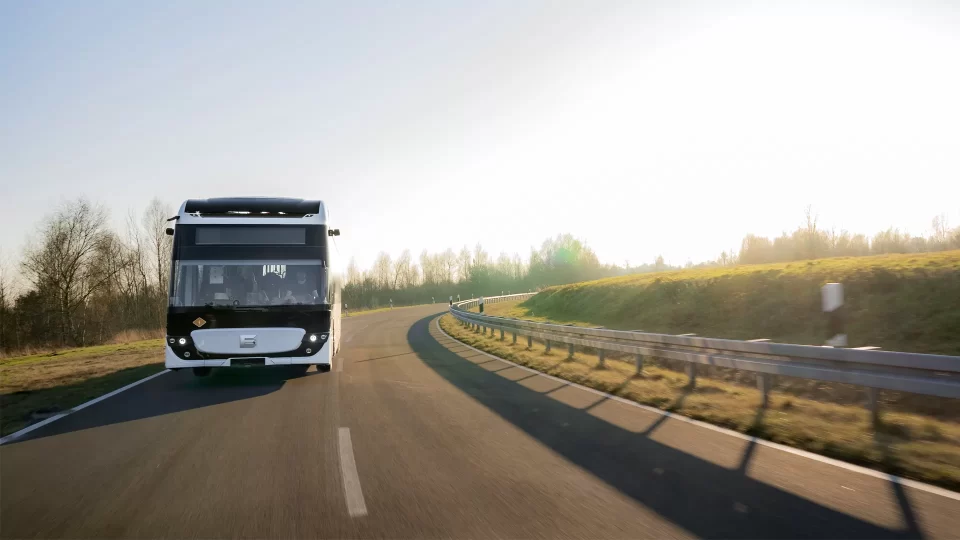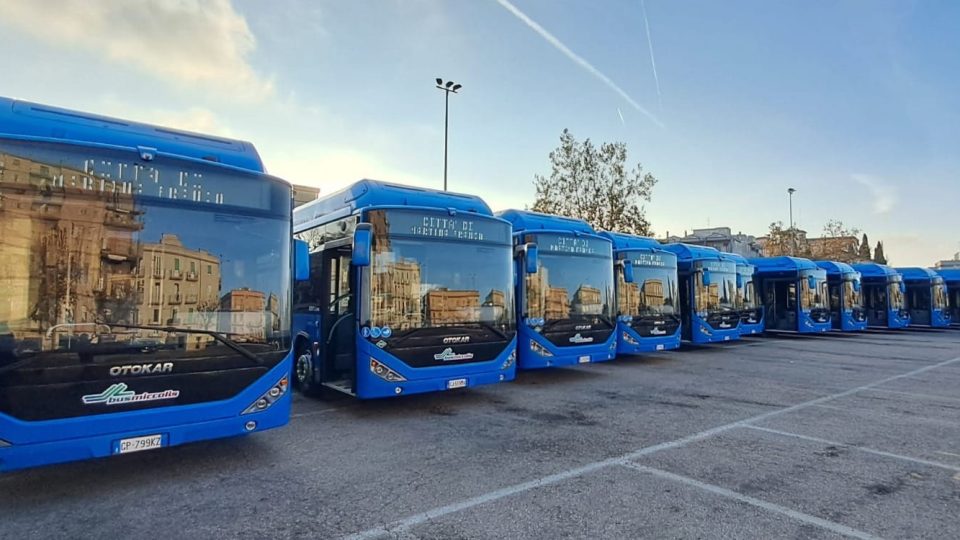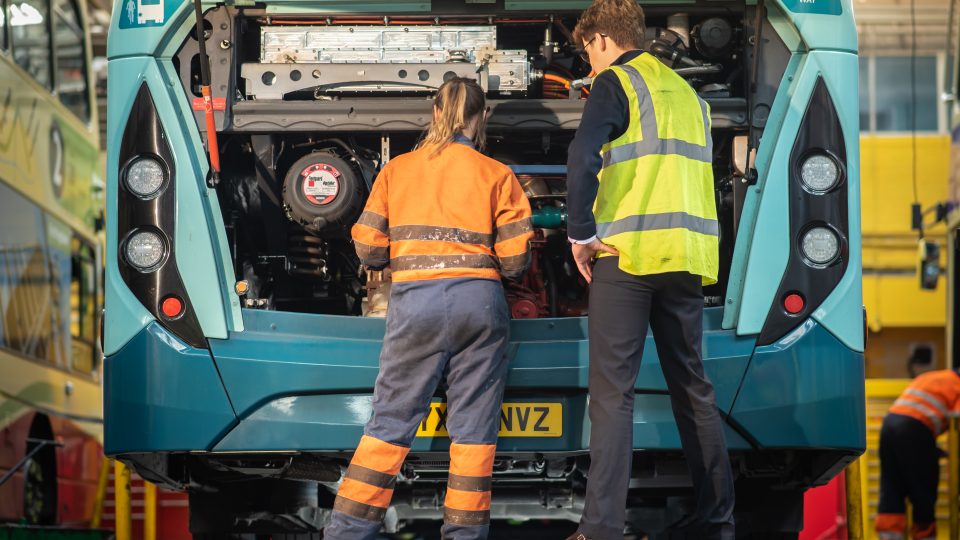Is the Buses Bill going to shake the UK bus industry up?
The UK’s bus operation has the potential for the most significant change in a generation. On 9 September, Transport Minister Louise Haigh MP presented the Buses Bill, giving all English local transport authorities (LTAs) the power to operate as a franchise. In effect, this will enable LTAs to run their services on the same basis […]
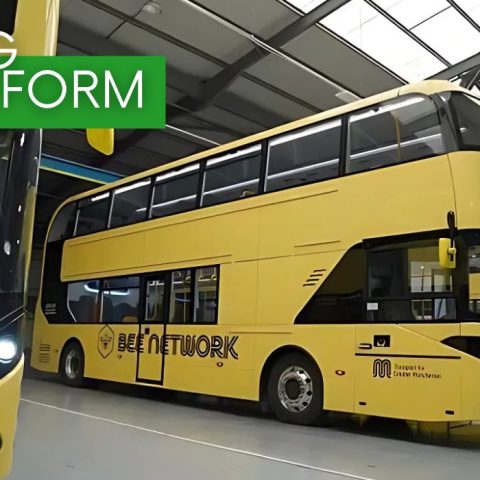
The UK’s bus operation has the potential for the most significant change in a generation. On 9 September, Transport Minister Louise Haigh MP presented the Buses Bill, giving all English local transport authorities (LTAs) the power to operate as a franchise. In effect, this will enable LTAs to run their services on the same basis as London, with freedom over routes, frequency, operational hours, and ticket pricing.
This article, authored by Alex Byles, was published on the
November 2024 issue of Sustainable Bus magazine.

Joining the capital, Manchester adopted this model in September 2023, and since then, a handful of metropolitan areas have also declared their intention. But with the new government legislation, the franchising option will now be open to all LTAs outside London – while the devolved administrations of Wales, Scotland, and Northern Ireland manage their own affairs separately. The Buses Bill will likely be introduced by government in Spring/Summer 2025.
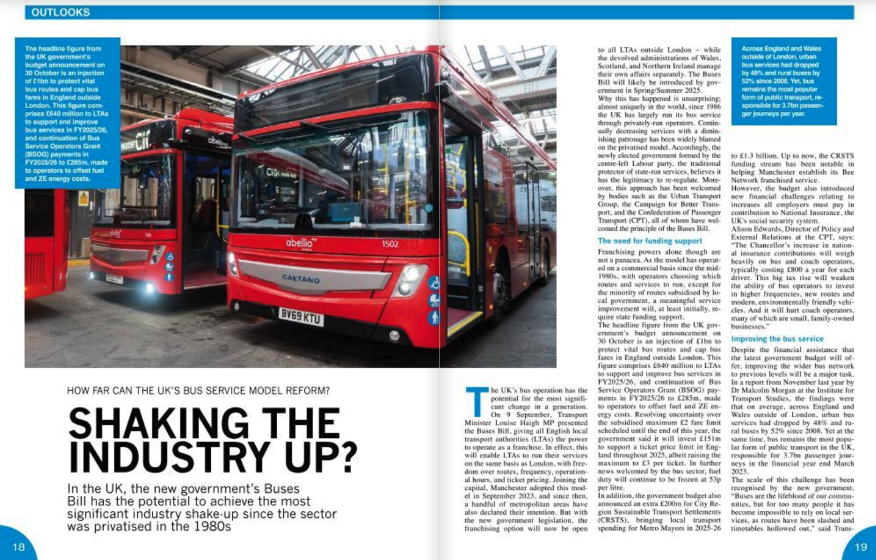
Why this has happened is unsurprising; almost uniquely in the world, since 1986 the UK has largely run its bus service through privately-run operators. Continually decreasing services with a diminishing patronage has been widely blamed on the privatised model. Accordingly, the newly elected government formed by the centre-left Labour party, the traditional protector of state-run services, believes it has the legitimacy to re-regulate. Moreover, this approach has been welcomed by bodies such as the Urban Transport Group, the Campaign for Better Transport, and the Confederation of Passenger Transport (CPT), all of whom have welcomed the principle of the Buses Bill.
The headline figure from the UK government’s budget announcement on
30 October is an injection of £1bn to protect vital bus routes and cap bus fares in England outside London. This figure comprises £640 million to LTAs to support and improve bus services in FY2025/26, and continuation of Bus Service Operators Grant (BSOG) payments in FY2025/26 to £285m, made to operators to offset fuel and ZE energy costs.
UK Buses Bill and the need for funding support
Franchising powers alone though are not a panacea. As the model has operated on a commercial basis since the mid-1980s, with operators choosing which routes and services to run, except for the minority of routes subsidised by local government, a meaningful service improvement will, at least initially, require state funding support.
The headline figure from the UK government’s budget announcement on 30 October is an injection of £1bn to protect vital bus routes and cap bus fares in England outside London. This figure comprises £640 million to LTAs to support and improve bus services in FY2025/26, and continuation of Bus Service Operators Grant (BSOG) payments in FY2025/26 to £285m, made to operators to offset fuel and ZE energy costs.
The ZEBRA Scheme has been integral to the transition, which could see ZE buses comprising up to 20% of the UK fleet within 2 years. In October the Department for Transport reported that the Transport Secretary will announce plans to create a new UK Bus Manufacturing Expert Panel.
Resolving uncertainty over the subsidised maximum £2 fare limit scheduled until the end of this year, the government said it will invest £151m to support a ticket price limit in England throughout 2025, albeit raising the maximum to £3 per ticket. In further news welcomed by the bus sector, fuel duty will continue to be frozen at 53p per litre.
In addition, the government budget also announced an extra £200m for City Region Sustainable Transport Settlements (CRSTS), bringing local transport spending for Metro Mayors in 2025-26 to £1.3 billion. Up to now, the CRSTS funding stream has been notable in helping Manchester establish its Bee Network franchised service.
However, the budget also introduced new financial challenges relating to increases all employers must pay in contribution to National Insurance, the UK’s social security system.
Alison Edwards, Director of Policy and External Relations at the CPT, says: “The Chancellor’s increase in national insurance contributions will weigh heavily on bus and coach operators, typically costing £800 a year for each driver. This big tax rise will weaken the ability of bus operators to invest in higher frequencies, new routes and modern, environmentally friendly vehicles. And it will hurt coach operators, many of which are small, family-owned businesses.”
Across England and Wales outside of London, urban bus services had dropped by 48% and rural buses by 52% since 2008. Yet, bus remains the most popular form of public transport, responsible for 3.7bn passenger journeys per year.
Improving the bus service
Despite the financial assistance that the latest government budget will offer, improving the wider bus network to previous levels will be a major task. In a report from November last year by Dr Malcolm Morgan at the Institute for Transport Studies, the findings were that on average, across England and Wales outside of London, urban bus services had dropped by 48% and rural buses by 52% since 2008. Yet at the same time, bus remains the most popular form of public transport in the UK, responsible for 3.7bn passenger journeys in the financial year end March 2023.
The scale of this challenge has been recognised by the new government. “Buses are the lifeblood of our communities, but for too many people it has become impossible to rely on local services, as routes have been slashed and timetables hollowed out,” said Transport Minister Louise Haigh MP on the day of the Buses Bill announcement.
The bus sector awaits confirmation on timing to end the sale of non-ZE vehicles, currently listed as the fall-back date of2040. While this presents uncertainty, the recent budget has not provided clarity on whether the current ZE vehicle subsidy will continue.
Clearly, the cost to redress the decline in a meaningful way will be expensive. Manchester’s Bee Network, for example, has been significantly financed as part of its £1.07bn CRSTS award, though the network also covers train, tram, roads, and cycle lanes for a metropolitan area that includes around 2.9million people.
Has the latest government budget gone far enough to support the sector? In reaction, CPT’s Alison Edwards says: “Collectively, the bus and coach sector is vital in achieving the Government’s missions of kickstarting economic growth and breaking down barriers to opportunity. However, contradictory policies which, on the one hand, support public transport and on the other hand impose substantial extra costs, are unhelpful.”
Meanwhile, the next opportunity for a funding boost could come within the detail of the Buses Bill implementation.
Support for the ZE transition
Improving bus service reliability, as well as journey time and frequency, will not only be integral to achieve the long-term growth in patronage for the economic sustainability of franchised services, but encouraging the modal shift from car to bus will also be important to meet climate targets. A report by Lisa Hopkinson at sustainable transport consultancy Transport for Quality of Life, says that to meet carbon targets, England and Wales outside of London need to increase bus passenger kilometres by 120% by 2030 compared to 2019, pre-Covid figures. A more conservative estimate by CPT still says that bus passenger km needs to increase by two-fifths (41%) by 2030 compared to 2019 levels.
A report by Lisa Hopkinson at sustainable transport consultancy Transport for Quality of Life, says that to meet carbon targets, England and Wales outside of London need to increase bus passenger kilometres by 120% by 2030 compared to 2019. A more conservative estimate by CPT still says that bus passenger km needs to increase by two-fifths (41%) by 2030 compared to 2019 levels.
The Labour government has made important environmental commitments in its manifesto, including meeting the UK’s internationally agreed target to reduce carbon emissions by over two-thirds by 2030. While the government has reinforced its pledge to phase out new cars that rely solely on internal combustion engines by 2030, and that from 2035 all new cars and vans sold in the UK will be zero emission, the bus sector awaits confirmation on timing to end the sale of non-ZE vehicles, currently listed as the fall-back date of 2040. While this presents uncertainty for manufacturers as well as operators, the recent budget has not provided clarity on whether the current ZE vehicle subsidy will continue. Up to now, the Department for Transport’s (DfT) Zero Emission Bus Regional Areas (ZEBRA) Scheme has been integral to the transition, which could see ZE buses comprising up to 20% of the total UK fleet within the next two years from already allocated funding.
In support of the UK’s bus manufacturing programme, in October the Department for Transport reported that the Transport Secretary will announce plans to create a new UK Bus Manufacturing Expert Panel. The department says the panel will bring together industry experts and local leaders to explore ways to ensure the UK remains a leader in bus manufacturing, help local authorities deliver on their transport ambitions, and begin to seize opportunities to embrace zero emission transport technologies. Yet, how far the government subsidy towards the ZE transition will continue also looks set to depend on the implementation of the Buses Bill.




